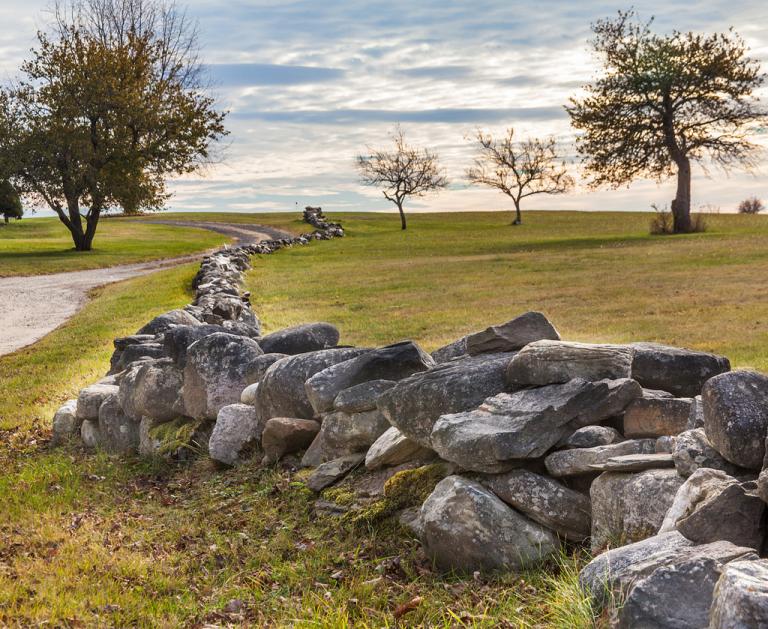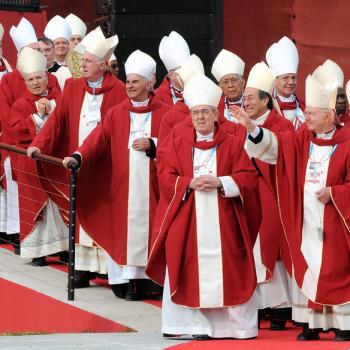
My fellow Patheos blogger Roger Olsen has written an eloquent critique of President Trump’s desire for a border wall and of walls in general. Throughout, he cites a recurring line from Robert Frost’s poem “Mending Wall”: “Something there is that doesn’t love a wall.” But that poem has another recurring line: “Good fences make good neighbors.”
The poem is NOT about physical barriers along the border. Rather, it is about the stone fences that separate New England farms. And, metaphorically, it is about the paradox that human relationships need both openness and privacy, free exchanges and personal boundaries. The poem captures well the sense in which we do need walls as well as the sense in which we do need them. It includes a dialogue between a “pro-wall” person and an “anti-wall” person, giving both their due.
As such, it may help us think through the wisdom of that proposed border wall, at least to clarify the issues. Then again, it may not. At any rate, it is a wonderful poem. (Lots of Frost’s poems are going into public domain as of this year, along with a vast amount of other classic literature due to a quirk in the copyright law, though the copyright for this particular poem has already expired, so I can quote it in its entirety.)
Something there is that doesn’t love a wall,
That sends the frozen-ground-swell under it,
And spills the upper boulders in the sun;
And makes gaps even two can pass abreast.
The work of hunters is another thing:
I have come after them and made repair
Where they have left not one stone on a stone,
But they would have the rabbit out of hiding,
To please the yelping dogs. The gaps I mean,
No one has seen them made or heard them made,
But at spring mending-time we find them there.
The piled-up stones that constitute the fences keep falling down. Nature causes them to fall (such as the effect of freezes) as do human beings (such as hunters who don’t respect the landowner’s property). But the speaker cannot really explain the big gaps.
I let my neighbour know beyond the hill;
And on a day we meet to walk the line
And set the wall between us once again.
We keep the wall between us as we go.
To each the boulders that have fallen to each.
And some are loaves and some so nearly balls
We have to use a spell to make them balance:
“Stay where you are until our backs are turned!”
We wear our fingers rough with handling them.
Oh, just another kind of out-door game,
One on a side. It comes to little more:
So once a year, in the spring, the speaker sets a date for his neighbor and they mend the wall. Each farmer, on his side, picks up the rocks and piles them back, working along the line across from each other, having conversation as they work.
There where it is we do not need the wall:
He is all pine and I am apple orchard.
My apple trees will never get across
And eat the cones under his pines, I tell him.
He only says, “Good fences make good neighbours.”
Actually, they don’t need the wall. The speaker raises apples, and the neighbor’s land is all woods. Their different kinds of property will not intrude on each other if the stone fence didn’t exist. But the other farmer says that the barrier between them helps them to be good neighbors to each other.
Spring is the mischief in me, and I wonder
If I could put a notion in his head:
“Why do they make good neighbours? Isn’t it
Where there are cows? But here there are no cows.
Before I built a wall I’d ask to know
What I was walling in or walling out,
And to whom I was like to give offence.
The poet light-heartedly challenges the other farmer. Why do we need fences? Yes, if one of us had cows, a fence would be necessary to keep them from wandering away and damaging the other one’s property. But neither of us have cows!
He then raises a bigger issue about walls. Are we walling in or walling out? The wall around a prison keeps people in. The wall around a castle keeps enemies out. The Berlin Wall kept those oppressed by East German Communism from leaving the country. The Great Wall of China helped prevent enemies from invading.
What is the purpose of this particular wall? Might my walling someone out be needlessly offensive?
Something there is that doesn’t love a wall,
That wants it down.” I could say “Elves” to him,
But it’s not elves exactly, and I’d rather
He said it for himself. I see him there
Bringing a stone grasped firmly by the top
In each hand, like an old-stone savage armed.
He moves in darkness as it seems to me,
Not of woods only and the shade of trees.
He will not go behind his father’s saying,
And he likes having thought of it so well
He says again, “Good fences make good neighbours.”
But if he is walling his neighbor out, the neighbor is not offended. And yet the poet describes the neighbor in terms of a stone-aged “savage,” who uses such stones as weapons. He “moves in darkness.” The implication is that there is something primitive and atavistic in this impulse to build walls.
But the poet lets the other farmer have the last word: We do need “our own space.” We need “our boundaries,” as part of our sense of self-protection, our privacy, all of which are psychologically necessary for our sense of personal integrity. This desire is not opposed to the neighbor. Mending the wall is a mutual act of friendship. It’s the gaps in the wall that are acts of aggression and thoughtlessness to other people. The goal of having the shared fence is to be “good neighbors.”
Thus saith our text. Does this poem have any application to the current debate about a wall between the U.S. and Mexico? If we had one, could that make us “good neighbors”? Or would that work only if the two countries built it together, as these two neighbors do? Is Trump’s impulse for the wall like that of “an old-stone savage armed”? He is clearly aware of what he is walling out and walling in. He is “walling out.” Are defensive walls always legitimate? Or do we need to factor in “to whom we are like to give offence”?
This poem is usually taken to be an exploration of the personal quality associated with New Englanders of friendly reserve. Do you see how we sometimes do need to tear down the walls between us, and yet how we also need certain kinds of boundaries in order to have good relationships? A relationship totally without boundaries can be smothering, just as a relationship in which both parties are ensconced in their own space is isolating. The act of “mending” the walls suggests a positive “fixing,” an act of mutual co-operation that restores the proper balance. (Notice how the two workers have to “balance” the rocks.) Is there an equivalent resolution in international relations?














